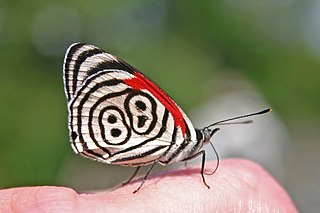In Greek mythology, Ceryx was a son of Hermes and either Pandrosus or Agraulus. He was, like his father, a messenger. But the kêryx career began as a humble cook for the tribe, a skill Hermes demonstrates in his cooked meat offerings on the Twelve Gods Altar set in place 522BC by Peisistratos III in Athens. The Homeric Hymn to Hermes 128 recalls the young god cutting out and laying up twelve steaks on a flat rock or platamoni," the 12 Gods altar.

Ceryx is a genus of moths in the family Erebidae. It was described by Hans Daniel Johan Wallengren in 1863.

Diaethria is a brush-footed butterfly genus found in the Neotropical realm, ranging from Mexico to Paraguay.
Spur-throated grasshopper may refer to several insects of the family Acrididae:

Avitta is a genus of moths of the family Noctuidae described by Francis Walker in 1858.

"Black Box" is the debut single by season seven winner of Australian Idol, Stan Walker. It was released digitally on 22 November 2009, as the lead single from his debut studio album, Introducing... Stan Walker. Blue covered this song for their new album Roulette.

The spur-throated locust is a native Australian insect in the family Acrididae and a significant agricultural pest.
Similodonta is an extinct genus of early bivalve in the extinct family Praenuculidae. The genus is one of eleven genera in the subfamily Praenuculinae. Similodonta is known from Middle Ordovician through Middle Silurian fossils found in Europe and North America. The genus currently contains eight accepted species, Similodonta ceryx, Similodonta collina, Similodonta djupvikensis, Similodonta magna, Similodonta recurva, Similodonta spjeldnaesi, Similodonta wahli and the type species Similodonta similis.
Ceryx albimacula is a moth of the subfamily Arctiinae. It was described by Francis Walker in 1854. It is found in Cameroon, the Republic of the Congo, the Democratic Republic of the Congo, Equatorial Guinea, Gabon, Ghana, Ivory Coast, Nigeria and Sierra Leone.
Ceryx ampla is a moth of the subfamily Arctiinae. It was described by Francis Walker in 1864. It is found on Aru in Indonesia and Papua New Guinea.
Ceryx diptera is a moth of the subfamily Arctiinae. It was described by Johan Christian Fabricius in 1775. It is found in southern India and Sri Lanka. In male, the body is black. Frons, collar and tegulae are yellow. Forewings with a sub-basal, two medial, one sub-apical and two sub-marginal hyaline (glass-like) spots. Hindwings with a sub-basal joined to a sub-marginal spot. Tarsi black. Female is similar to male, but differ with the abdomen dilated and with a tuft of ochreous hairs.
Ceryx kuehni is a moth of the subfamily Arctiinae. It was described by Rothschild in 1910. It is found on Taam Island, west of Key Islands.
Ceryx morobeensis is a moth of the subfamily Arctiinae. It was described by Obraztsov in 1957. It is found in New Guinea.
Ceryx pseudovigorsi is a moth of the subfamily Arctiinae. It was described by Nievenhs. in 1946. It is found on Sulawesi.
Ceryx sphenodes is a moth of the subfamily Arctiinae. It was described by Meyrick in 1886. It is found in New Guinea and Australia (Queensland).
Ceryx fulvescens is a moth in the subfamily Arctiinae. It was described by Francis Walker in 1854. It is found in the Republic of the Congo, the Democratic Republic of the Congo, Kenya, Lesotho, Mozambique, Rwanda, Somalia, South Africa, Zambia and Zimbabwe.
Utetheisa guttulosa is a moth in the family Erebidae. It was described by Francis Walker in 1864. It is found on Sulawesi.
The Syntomini are a tribe of moths in the family Erebidae.

Austracris is a genus of Orthoptera: Caeliferan insect in the family Acrididae: subfamily Cyrtacanthacridinae. It includes an Australian pest, the spur-throated locust.







